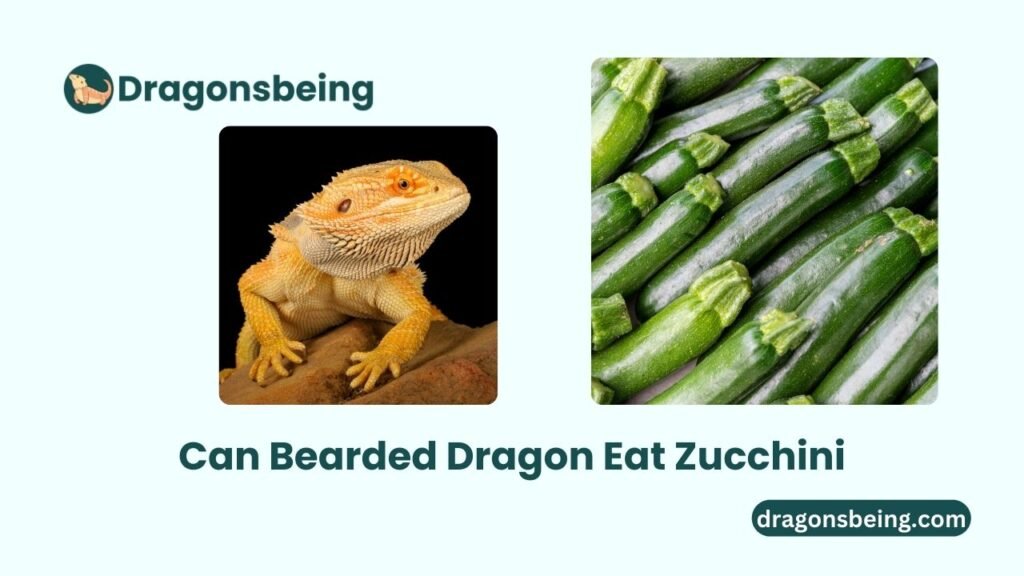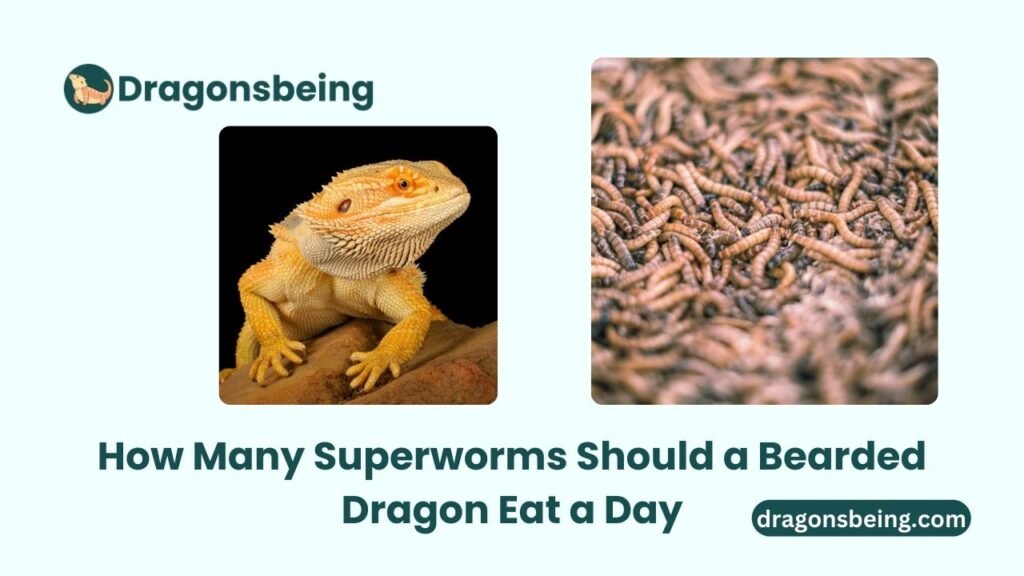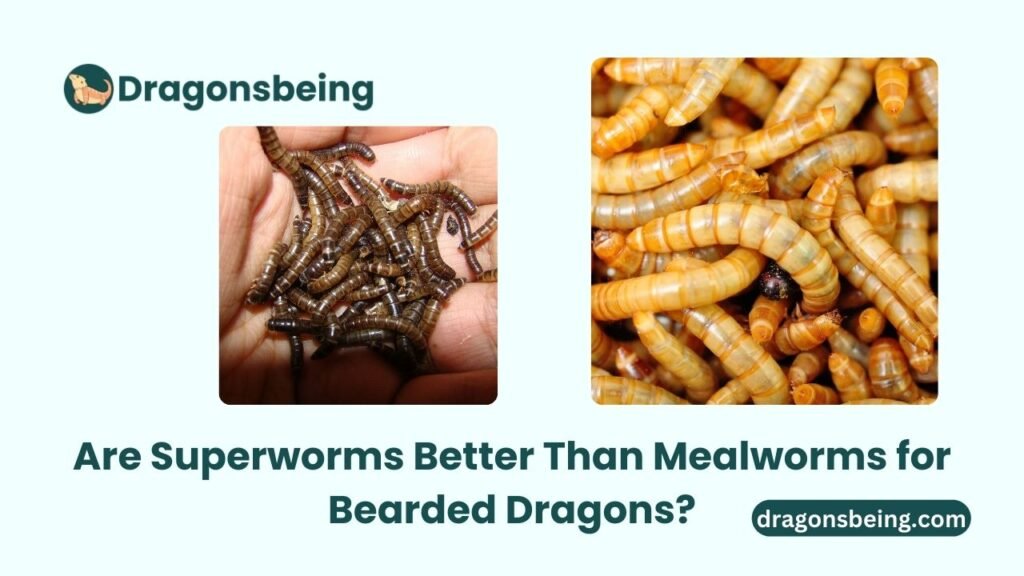Yes, bearded dragons can eat zucchini. This vegetable is safe and can be included in their diet in moderation.
Zucchini is a popular vegetable among many reptile owners. It offers hydration and essential nutrients, making it a healthy treat.
Bearded dragons thrive on a varied diet, including vegetables, fruits, and insects. Introducing zucchini can add diversity and encourage your pet to explore new flavors.
Always chop it into manageable pieces to prevent choking. While zucchini is not the most nutrient-dense option, its low oxalate content makes it a good choice in moderation.
Balancing zucchini with other vegetables ensures your bearded dragon receives a well-rounded diet. Understanding their dietary needs is key to promoting their health and happiness.
Zucchini As A Reptile Food
Zucchini is a popular vegetable among reptile owners. It offers a variety of nutrients. Bearded dragons can safely enjoy zucchini as part of their diet. This vegetable is both tasty and easy to prepare.
Nutritional Profile Of Zucchini
Zucchini provides several important nutrients for bearded dragons. Here is a breakdown of its nutritional content:
| Nutrient | Amount per 100g |
|---|---|
| Calories | 17 |
| Protein | 1.2g |
| Carbohydrates | 3.1g |
| Fiber | 1g |
| Water | 95% |
| Vitamin A | 83 IU |
| Calcium | 18mg |
Zucchini is low in calories. It contains a high amount of water. This helps keep your bearded dragon hydrated. It also provides vitamins and minerals that support health.
Popularity Of Zucchini In Reptile Feeding
Zucchini is popular among reptile owners for several reasons:
- Easy to find in grocery stores
- Simple to prepare and serve
- Low in oxalates, making it safe
Many owners report that their bearded dragons enjoy it. Offering zucchini can add variety to their meals. It is a great way to encourage healthy eating habits.
Try mixing zucchini with other vegetables. This helps create a balanced diet for your bearded dragon. Keep the portions moderate to avoid any digestive issues.
Bearded Dragons And Vegetables
Bearded dragons need a balanced diet. Vegetables play a key role in their health. They provide essential vitamins and minerals. Understanding which vegetables are best is important.
Role Of Vegetables In Their Diet
Vegetables are crucial for bearded dragons. They offer hydration and nutrients. A diet rich in vegetables supports digestion. It also aids in overall well-being.
- Fiber: Helps digestion and prevents constipation.
- Vitamins: Supports immune function and growth.
- Minerals: Strengthens bones and muscles.
Mixing different vegetables can enhance nutrition. Fresh vegetables should be offered daily. Avoid overcooked or canned vegetables. They lose nutrients and are less beneficial.
Preferred Vegetables For Bearded Dragons
Some vegetables are more suitable than others. Here’s a list of preferred options:
| Vegetable | Nutritional Benefits |
|---|---|
| Zucchini | Low in calories and hydrating |
| Collard Greens | Rich in calcium and vitamins |
| Carrots | High in beta-carotene |
| Bell Peppers | High in vitamins A and C |
| Squash | Good source of fiber and vitamins |
Offer a variety of vegetables for balanced nutrition. Chop them into small pieces for easy eating. Always wash them thoroughly to remove pesticides.
Remember to observe your bearded dragon’s preferences. Some may favor specific vegetables. Adjust their diet based on their liking and health.
Feeding Zucchini To Bearded Dragons
Bearded dragons can enjoy a variety of vegetables. Zucchini is one of them. It offers hydration and nutrition. Let’s explore how to prepare it and the right amounts to serve.
Preparing Zucchini For Consumption
Properly preparing zucchini is essential for your bearded dragon. Follow these simple steps:
- Wash the zucchini thoroughly to remove dirt and pesticides.
- Cut the zucchini into small, manageable pieces.
- Remove the seeds, as they can be harmful.
- Optionally, steam or blanch the pieces for easier digestion.
Always serve zucchini at room temperature. Cold food can upset their stomach.
Safe Quantities And Frequency
Feeding zucchini in moderation is key. Here are some guidelines:
| Age of Bearded Dragon | Recommended Serving | Frequency |
|---|---|---|
| Juvenile (up to 6 months) | 1-2 small pieces | 2-3 times a week |
| Adult (6 months and older) | 2-3 small pieces | 1-2 times a week |
Monitor your dragon’s reaction to zucchini. Stop feeding it if any signs of discomfort appear.
Always balance zucchini with other vegetables and greens. A varied diet keeps your bearded dragon healthy.
Benefits Of Zucchini For Bearded Dragons
Zucchini offers many benefits for bearded dragons. This tasty vegetable is nutritious and hydrating. It can be a great addition to their diet. Let’s explore its key advantages.
Vitamins And Minerals In Zucchini
Zucchini is packed with essential vitamins and minerals. These nutrients support your bearded dragon’s health.
| Nutrient | Benefit |
|---|---|
| Vitamin A | Supports vision and immune function. |
| Vitamin C | Boosts the immune system and helps skin health. |
| Calcium | Promotes strong bones and teeth. |
| Potassium | Helps in muscle function and heart health. |
Feeding zucchini gives your bearded dragon vital nutrients. These vitamins and minerals enhance their overall well-being.
Hydration From Zucchini
Zucchini contains a high water content. This helps keep your bearded dragon hydrated.
- Water content: Approximately 95%.
- Helps prevent dehydration.
- Supports digestion and nutrient absorption.
Hydration is crucial for bearded dragons. Including zucchini in their diet can assist in keeping them healthy and active.
Potential Risks And Considerations
Feeding your bearded dragon zucchini has some risks. Understanding these can help keep your pet healthy. Below are important factors to consider.
Oxalates And Goitrogens In Zucchini
Zucchini contains compounds that can be harmful in large amounts. Two main concerns are:
- Oxalates: These can bind to calcium. This may lead to kidney stones.
- Goitrogens: These can affect thyroid function. This may cause health issues.
Limit zucchini intake to avoid these problems. Always mix zucchini with other foods. This helps balance the diet.
Zucchini As Part Of A Balanced Diet
Zucchini should not be the main food. It is low in nutrition. Instead, offer a variety of vegetables and proteins.
Consider these options:
| Food Type | Example Foods |
|---|---|
| Leafy Greens | Kale, Collard Greens, Mustard Greens |
| Vegetables | Carrots, Bell Peppers, Squash |
| Protein | Crumble of Insects, Cooked Chicken |
Monitor your bearded dragon’s health. Watch for signs of discomfort after eating zucchini. Adjust their diet as needed.
Alternative Vegetables For Bearded Dragons
Bearded dragons thrive on a varied diet. While zucchini is safe, many other vegetables provide nutrients. Offering different options keeps your pet healthy and happy.
Other Safe Vegetables
Here are some safe vegetables for bearded dragons:
- Carrots
- Collard greens
- Mustard greens
- Bell peppers
- Squash
- Sweet potatoes
These vegetables are nutritious and easy to digest. Always chop them into small pieces. This prevents choking and makes eating easier.
Diversity In The Diet
Diverse diets benefit bearded dragons greatly. It ensures they get all necessary nutrients. Rotate vegetables weekly to maintain interest. Here’s a simple plan:
| Day | Vegetable |
|---|---|
| Monday | Carrots |
| Tuesday | Collard greens |
| Wednesday | Bell peppers |
| Thursday | Mustard greens |
| Friday | Squash |
| Saturday | Sweet potatoes |
| Sunday | Mixed greens |
Always wash vegetables thoroughly. Avoid pesticides and chemicals. Fresh food is best for your bearded dragon.
Expert Opinions And Care Tips
Understanding whether bearded dragons can eat zucchini involves expert insights. Various veterinarians and reptile specialists have shared their views. They emphasize balanced diets for optimal health.
Veterinarian Recommendations
Veterinarians often suggest the following:
- Limit zucchini to occasional treats.
- Ensure zucchini is fresh and chopped finely.
- Monitor for signs of digestive issues.
- Combine zucchini with leafy greens and protein sources.
Experts stress that zucchini should not replace staple foods. A varied diet prevents nutritional deficiencies.
Long-term Health And Diet Management
Long-term health requires careful diet management. Consider these tips for your bearded dragon:
- Offer a mix of vegetables, fruits, and insects.
- Change food options weekly for variety.
- Watch for weight changes; adjust diet if needed.
- Consult a veterinarian regularly for health checks.
Include a table for a better understanding of food options:
| Food Type | Frequency | Benefits |
|---|---|---|
| Leafy Greens | Daily | High in vitamins and minerals |
| Insects | 3-4 times a week | Protein source for growth |
| Fruits | Occasional | Natural sugars and hydration |
| Zucchini | Rarely | Hydration and fiber |
Following these guidelines helps ensure your bearded dragon thrives.
Frequently Asked Questions
Can Bearded Dragons Eat Zucchini Raw?
Yes, bearded dragons can eat raw zucchini in moderation. It’s nutritious and provides hydration.
Is Zucchini Safe For Bearded Dragons?
Zucchini is safe for bearded dragons. It contains vitamins and minerals beneficial for their health.
How To Prepare Zucchini For Bearded Dragons?
Wash and slice zucchini into small pieces. Serve it raw or lightly steamed for easier digestion.
How Often Can Bearded Dragons Eat Zucchini?
Offer zucchini once or twice a week. Balance it with other vegetables and proteins for a varied diet.
What Are The Nutritional Benefits Of Zucchini?
Zucchini is low in calories and high in water content, promoting hydration and digestive health in bearded dragons.
Can Zucchini Replace Other Vegetables For Bearded Dragons?
Zucchini shouldn’t replace other vegetables. Variety is essential for a balanced diet in bearded dragons.
Conclusion
Bearded dragons can safely eat zucchini in moderation. This vegetable offers hydration and essential nutrients. Always chop it into small, manageable pieces.
Monitor your pet’s reactions to new foods. A balanced diet is key to their health. Keep experimenting with different veggies for variety and enjoyment in their meals.

Hi, I’m Dr. Michelle Mayers, a veterinary professional with a deep passion for animal health and well-being. Over the years, I’ve dedicated my life to caring for animals and helping pet owners better understand their furry, feathered, or scaly companions. On my blog, Dragonsbeing, I share insights, tips, and stories that aim to educate, inspire, and connect with fellow animal lovers. Join me at Dragonsbeing as we explore the fascinating world of veterinary care and celebrate the special bond between humans and animals!


